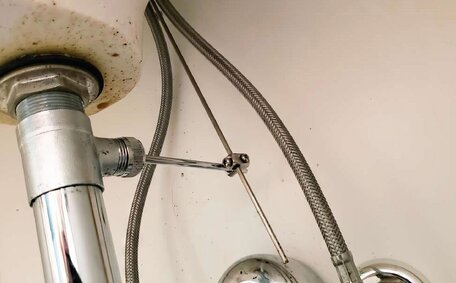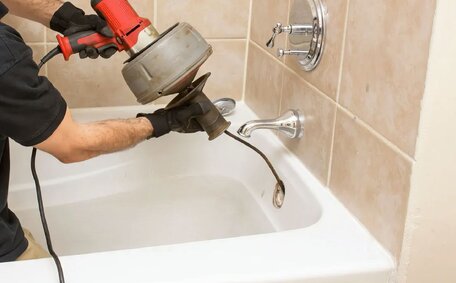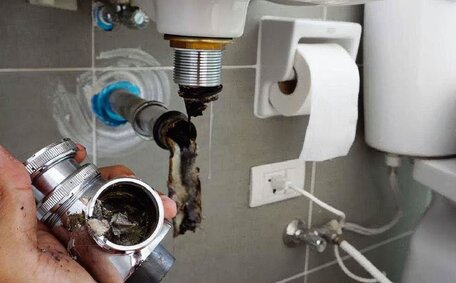Introduction: Comparing Kitchen vs. Bathroom Sink Plumbing
Welcome to our comprehensive guide on the distinct differences and plumbing nuances between kitchen and bathroom sinks.
As leading Sans Souci plumbers with over 10 years’ experience unblocking drains, we often get asked how kitchen sink blockages differ to bathroom sinks. While both cause frustration when blocked, it’s valuable to understand what leads to a blocked kitchen or bathroom sink so you can resolve issues promptly.
In this article, we’ll cover the reasons why kitchen and bathroom sinks get blocked, from fats and food waste to hair and soap scum.
This guide offers proven solutions for unclogging and maintaining smooth sink drainage. We’ll also explain when to consider professional drain cleaning services to prevent further damage.
Continue reading to learn rapid unblocking techniques and understand the unique reasons behind kitchen versus bathroom sink blockages.
Common Causes of Kitchen Sink Clogs
Kitchen sinks can face unique clogging challenges compared to bathroom sinks. This is often due to improper substances being poured down kitchen drains, leading to blockages.
The primary cause of blockages in kitchen sinks is the build-up of fats, oils, and grease (FOG). Just one cup of cooking oil poured down the sink can lead to significant pipe build-up, creating a surface that traps food particles and leads to clogs.
Coffee grounds, food particles, grease, and small items such as bottle caps can easily become trapped in FOG accumulations. As layers accumulate, the issue of a slow draining sink arises due to reduced water flow down drain pathways until a blockage is formed.
It is uncommon for hair and soap scum from bathroom routines to affect kitchen sinks. Instead, daily cooking residue steadily blocks drains. Stuck fats that prevent the sink from draining smoothly can very well turn rancid, making smells linger.
Understanding how to deal with a sink clogged shows that pouring grease down is a bad habit leading to severe clogs. To prevent blockages, avoid pouring fats and other substances down your drains and use garbage disposal units responsibly. It’s most important to strain excess solids first and prevent oil/grease from contaminating your sink water.
Typical Causes of Bathroom Sink Blockages
Hair and soap scum are the primary contributors to bathroom sink blockages, with routine grooming and washing exacerbating the issue.
As we shampoo, condition, shave, and wash our faces over the basin, hair and skin cells slough off to go down the drain. These materials mix with accumulated soap scum hair, shaking off your careful grooming efforts and leading to blockages. Over time, thick mats within pipes can form, compounded by stray hairs obstructing the plughole from grooming activities.
With multiple household members carrying out their daily self-care at the bathroom sink, pipes fill faster. Narrow 1 1⁄4 inch bathroom sink drains also tend to clog more readily, straining out your system.
Gurgling sounds may indicate a blockage; inspect by looking down the drain. Hair and soap mats visible inside the drain can trap objects like cotton swabs or toothpaste caps that fall down the plughole.
While cooking waste can sometimes cause backups in bathroom sinks if the two share a main pipe, hair and soap scum remain the leading causes of bathroom sink issues in most homes.
Preventing Kitchen Sink Blockages
To minimise kitchen sink blockages, act promptly when you notice water draining slowly to prevent the sink from backing up.
Using sink strainers is a crucial measure to prevent food debris from entering the plumbing. Scrape plates thoroughly and dispose of grease and cooking oil in the bin instead of down the sink to keep drains clear.
Flush hot water regularly down the drain to dissolve grease, oils, and food residues. Maintain your drains using a baking soda and vinegar solution followed by more hot water to clear blockages and grime. Natural drain cleaners are an effective alternative.
If your kitchen shares a main line with the bathroom, installing hair catchers can prevent hair accumulation and protect your sinks from blockages.
In homes with septic systems, opt for gentle alternatives like enzyme-based cleaners and boiling water to avoid disrupting bacteria that break down waste.
Preventing Bathroom Sink Clogs
Bathroom sinks face frequent clogs from hair and soap buildup. Luckily, staying proactive keeps drains clear.
Install a drain stopper or use screens in all bathroom sinks to trap loose hairs before they slip down the drain. Clean strainers often as they quickly fill with strands during grooming or self-care over basins.
Pouring boiling water down the drain weekly can melt soap scum and flush out debris, keeping your bathroom sink clear.
To enhance cleaning, follow the boiling water with baking soda and vinegar to break down persistent blockages.
Opt for liquid bath products over bar soap, which can leave sticky residues that trap hair and contribute to clogs.
In households with multiple users, a cleaning schedule can mitigate clogs. Regularly clear away accumulated hair and use an old toothbrush for stubborn gunk.
Prevent blockages by keeping hair dye, oils, and thick conditioners out of the basin, as these items are prone to causing clogs.
DIY Methods to Clear Clogged Kitchen Drains
If your kitchen sink is blocked, try the following DIY unclog methods before seeking professional assistance:
Boiling Water
Boil a kettle of water and gently pour it into the blocked sink drain. The heat helps melt grease and the water flow dislodges debris. Repeat 2-3 times for optimal results.
Baking Soda and Vinegar
Plunger
Use a plunger effectively by filling halfway with water and plunging vigorously over the drain opening. This pressure helps rapidly clear the blockage.
Wire Coat Hanger
Straighten out a wire coat hanger and feed it down the drain to hook hair or debris. Twist gently to bring up the clog. Don’t scratch pipes.
Avoid chemical drain cleaners, as these can damage pipes while trying to get the job done on unclogging sinks. If DIY efforts don’t get the job done, you’ll need the expertise of a Sans Souci plumber to safely clear a stubborn kitchen sink blockage.
DIY Techniques for Unclogging Bathroom Sinks
Bathroom sinks face frequent clogs from hair and soap residue. Before calling a plumber, you can try these handy DIY methods to clear your blocked basin drain:
Use Pliers or Hooks
Inspect with a flashlight to see if removing hair or debris can salvage your plumbing. Use needlenose pliers or small hooks to gently pull up clumps of hair and soap scum caking pipes.
Apply a Natural Drain Cleaner
Mix 1 cup baking soda with 1 cup vinegar and pour into the blocked sink. Let bubble for 10-15 minutes then Follow the hot flush with cold water to help break up remaining gunk. You then can use commercial enzyme or bacterial drain cleaners that digest buildups.
Snake the Drain
You can buy a flexible drain snake, also known as a drain auger, at hardware stores to navigate through the pipes and fish out the clog. Slowly feed the hooked wire end down your sink drain while cranking the handle. Carefully can get rid of any debris dislodged.
Avoid harsh chemical drain cleaners that can seriously damage your pipes over time. Should you ponder how to unclog bathroom sink blockages and DIY methods fall short, call your local Sans Souci professional plumbers to avert damage.
When to Call a Professional Plumber
If DIY methods fail and your sink still drains slowly, or if recurring clogs quickly return, it might be time to seek professional help.
Our skilled team can address the most stubborn of obstructions and diagnose underlying issues such as invasive tree roots, pipe damage, or main sewer leaks affecting your home’s drainage.
If a blockage from fats means no water is draining, don’t hesitate to request prompt assistance. Ignoring a clog could lead to a sink full of standing water and the need for professional help.
For expert solutions, contact us at [email protected] or call 1300 349 338. Whether it’s a washing machine issue or a sink drainage problem, we’ll have your plumbing in the Sans Souci area working smoothly quickly.






